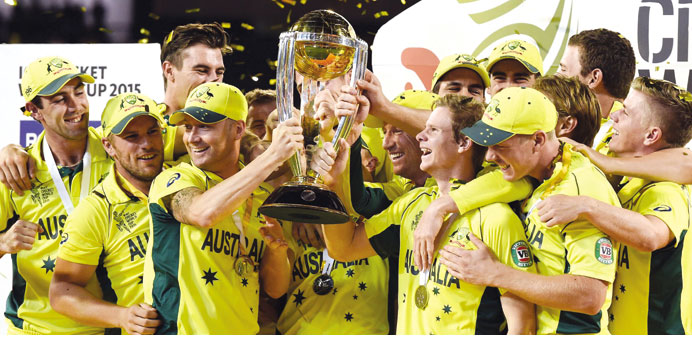Australian players celebrate with the World Cup trophy after beating New Zealand by seven wickets in the final in Melbourne yesterday. After bowling out the Kiwis for 183, Aussies took just 33.1 overs to reach the target. (AFP)
Mike Selvey in Melbourne/The Guardian
For the fourth time in five tournaments, the World Cup is in Australian hands, presented to the captain Michael Clarke on the outfield of this vast, soaring stadium under the floodlight glare and in a shower of gold glitter, with the Black Caps beaten by seven wickets.
Magnificent pace bowling first of all stifled the challenge of New Zealand and then blew them out of the water as the last seven wickets fell for 33 runs from the start of the second power play. Only Grant Elliott, the hero of the Auckland semi-final, who made 83, and Ross Taylor who sweated blood for 40, the pair adding 111 for the fourth wicket, had any answer to the Mitchells Starc and Johnson.
Along with James Faulkner, they shared eight of the wickets. Faulkner received the man-of-the-match award for 3-36, including a spell of 3-15 that changed the course of the game, and Starc was the man-of-the-tournament for 22 wickets at 10 runs apiece.
All out for 183, the Black Caps might have hoped that World Cup final history could repeat itself and that they might repeat India’s feat 32 years ago of defending that same total.
It was to prove a forlorn hope. Though the largest crowd ever recorded officially for a cricket match—93,013—saw Aaron Finch fall without scoring, in Trent Boult’s first over, it was a false dawn, for there were no demons to be found in this pitch beyond those to be extracted by high pace.
David Warner swished around at first but then clattered 45 at a run-a-ball to get things moving, and, after his dismissal Steve Smith and Clarke, steady at first and accelerating later, put together a third-wicket stand of 112 that took the side to the brink, before Smith finished the game off by pulling Matt Henry to the square leg ropes. There were 101 balls remaining.
Smith, enjoying an astounding run in all formats of the game, ended unbeaten and untroubled on 56, a measured effort from 71 balls with only three fours, while Clarke, who had stolen some of his team’s thunder by announcing his retirement from ODIs on the eve of the game, batted superbly for 74 from 72 balls with 10 fours and a six hit over long-off from Daniel Vettori, before he was bowled by Henry with eight runs required.
Thus a six-week tournament ends with the favourites taking a title they were always destined to claim if they could hold their nerve. This they did almost unwaveringly, faltering only in the nail-biter against these same opponents in Auckland and then only by the most slender of margins.
They really do have a powerful side, appropriate for the age and the conditions. But New Zealand have given the tournament a run for its money, reigniting a passion for the game in their homeland, not just by the manner in which they play their cricket, but the spirit in which they did so.
It is something that could serve as a lesson to some others. They leave Melbourne without the trophy but can do so with many friends and their heads held high.
Only when Brendon McCullum won the toss on a warm blue-bright autumn morning, and later, when Elliott and Taylor were attempting to repair things, did things go right for New Zealand.
Australia rarely allowed them breathing space beyond that, and for once, the force deserted the talismanic McCullum, who, staying true to himself in pursuit of a high octane start, threw the bat at his first three balls from Starc, missed them all and was neck-and-cropped by the last.
Starc, Josh Hazlewood and Johnson hardly put a delivery out of place in line or length, an exemplary display of new-ball bowling. By the time the 12th over was done, Martin Guptill and Kane Williamson had followed the captain and, one sensed, the game was already Australia’s to lose.
Under the circumstances, Elliott and Taylor deserve all credit for the manner in which they shrugged that aside and rebuilt, taking New Zealand to within striking distance of the last 15 overs and the cavalry charge that can bring, with seven wickets still in hand.
It was at this point, with the start of the batting power play and the shadow of the stands now falling distractingly across the pitch, that Faulkner turned the game on its head, having Taylor caught behind chasing the first ball of a new spell and then bowling the dangerous Corey Anderson with his third.
It opened the door for Starc and Johnson to blast the rest of the innings away. Only Elliott held sway, hitting 11 fours and a six, before another of those back-of-the-hand deliveries from Faulkner, deceptive because the seam is still presented upright, found him swinging too early and edging to Brad Haddin.
McCullum’s instinct is to attack come what may, but he really did need to find some inspiration for his bowlers if they were to make any impact. Boult duly removed Finch, who edged on to his pad and was caught and bowled. But from Smith’s first ball, into which he moved seamlessly and with time to spare, it just seemed obvious that he would bat through.
Perhaps a final indication that McCullum’s luck had run out came as early as the fifth over, after Warner had pummelled successive boundaries from Tim Southee.
McCullum’s nature would have told him to persist with his slip cordon. Instead, he moved second slip away and placed him at short extra cover, on the drive as they say. Warner edged the next delivery straight through second slip. Even he could smile wryly at that.
New Zealand gave it their all but the game was up, the race was won.

